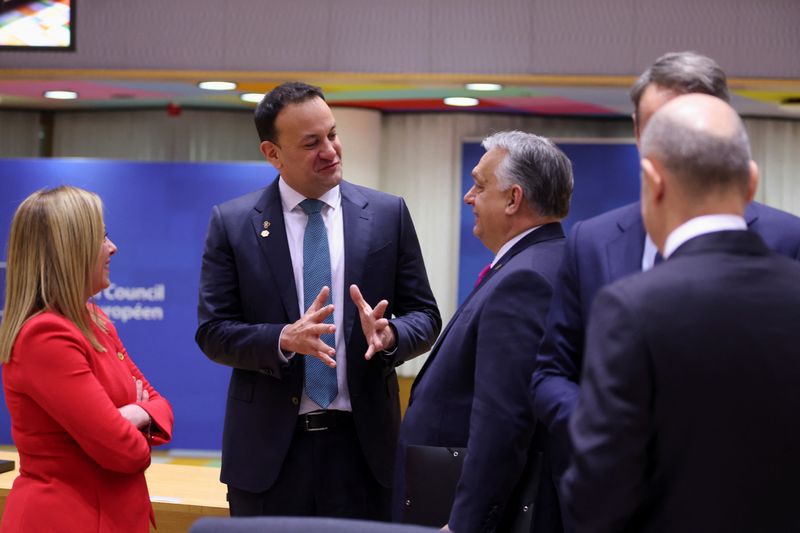By Gabriela Baczynska
BRUSSELS (Reuters) - European Union leaders said on Thursday they would tighten their borders to keep away unwanted immigrants, with some seeking more fences and walls while others would rather spend the money on improving living conditions in worse-off parts of the world.
Austria, the Netherlands, Belgium, Ireland and Denmark were among the 27 national leaders meeting in EU hub Brussels to express concern about increasing irregular arrivals, with some 330,000 border crossings recorded last year.
"European countries are experiencing a big increase in the number of people who are coming from outside Europe on an irregular basis," said Irish Prime Minister Leo Varadkar.
"It's important that we, as Europeans decide who enters our countries, not the human traffickers... Those who gain refugee status have the right to remain but others don't, and they should be returned."
Immigration has been a highly politically sensitive topic in the EU since 2015 when more than a million people - mostly fleeing the war in Syria - crossed the Mediterranean into Europe, and member states fought bitterly over how to provide for them.
Unable to agree, the bloc of 450 million people has turned to tightening its borders to prevent people from the Middle East, Africa and Asia from arriving, despite criticisms that such policy was inhuman and neglected labour market gaps.
From Spain and Greece to Latvia and Poland, there were more than 2,000 kilometres (1,240 miles) of border walls and fences in the EU in 2022, compared to just over 300 kilometres (185 miles) in 2014, according to a report by the European Parliament.
Still, with global mobility restarting since the COVID-19 pandemic, irregular arrivals into the EU rose last year to their highest level since 2016, reviving harsher anti-immigration rhetoric.
WALLS AND FENCES
"We need to 'pull the brake' on illegal migration in the EU," said Austrian Chancellor Karl Nehammer.
"We need the money for it, no matter if you call it a fence or boarder infrastructure. Bulgaria needs help when it comes to border surveillance and personnel, with technical equipment, every fence is only as good as there is effective surveillance."
The EU's executive, which holds the bloc's shared budget, has long refused to finance border walls, though it does pay for surveillance equipment and other infrastructure.
Luxembourg's prime minister, Xavier Bettel, spoke against financing walls, saying Europe's heritage was overcoming divisions after World War Two and eventually creating a 27-country zone where travellers can cross borders without checks.
"For the moment what is on the table is Bulgaria-Turkey ... but this will not be enough - so there will be again new fences and again new walls... Is the conclusion that we want a fortress in Europe?"
His Belgian counterpart said the situation amounted to "a major migration crisis", while the Dutch premier spoke in favour of restricting visas and aid to countries failing to cooperate.
Italy has called for more money for Africa, Hungary wanted more walls and France said the EU should help fight poverty and terrorism around the world, as well as combat global warming to see fewer people on the move.

The bloc's top diplomat said "Fortress Europe" was not the answer and that the EU should also offer immigrants some legal ways to get in: "People move because in their countries there is not a future, there is no peace, there is no stability," said Josep Borrell.
Catholic charity group Caritas said EU leaders should look into improving the bloc's asylum procedures and reception centres to "put human rights and dignity front and centre".